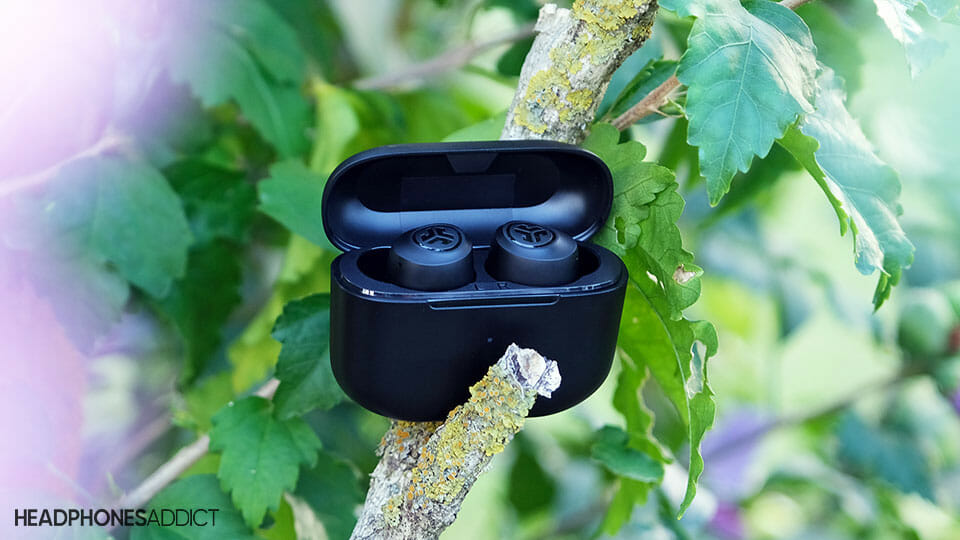
JLab Go Air Pop are dirt-cheap true wireless earbuds with pleasant bassy sound, excellent comfort, and splendid passive isolation. Is there something not to like?
Earbuds offer an enjoyable audio quality and a good set of features. That being said, they aren’t without faults. Their main competitors, like Skullcandy Dime and TOZO T10, have an edge.
Where do JLab Go Air Pop earbuds excel, and what are their main flaws? Should you pick them over the competition? Read our full review to make an educated decision.
- Enjoyable V-shaped sound w/ 3 EQ modes
- Comfortable & stable fit
- Excellent battery life (9+ hours per charge)
- 2-year warranty
- Above-average passive noise isolation
- An IPX4 (sweatproof) rating
- Plastic construction feels cheap & fragile
- Charging cable is built into the case
Sound

JLab Go Air Pop have a V-shaped sound signature with a large peak around 9kHz, adding brightness and shimmer to the mix.
Check the JLab Go Air Pop Sound Comparison
It’s commendable to see companies striving to tune their products to sound balanced. The JLab Go Air Pro come very close to sounding natural, at least in the “Balanced” EQ mode.
Speaking of EQ modes, earbuds offer 3:
- Bass Boost
- JLab Signature
- Balanced
Each adds or reduces bass quantity. Unfortunately, none of the EQ modes reduce the 9kHz peak.
JLab Go Air Pop Frequency Response

Bass: Only good when in Balanced mode
As mentioned, the 3 EQ modes essentially only change the bass quantity.
The “Balanced” mode is the best if you want to hear some details in instruments like bass guitars.
However, many will happily trade control for fun and extra punch and pick the “JLab Signature” instead.
The mode adds warmth to your music, and dig deeper into the sub-bass, providing some rumble. Due to the pretty noticeable boost, you’ll lose some details.
Lastly, if there still isn’t enough bass for you, you can toggle the “Bass Boost” setting. Just be aware that this mode completely bloats the music, making the sound noticeably quieter.
Midrange: Well-balanced
For the most part, mid-frequencies are where they should be. There are no massive peaks in this range, making for a quite natural presentation.
However, if you use them in JLab Signature or Bass Boost mode, expect to hear some bass bloat. Thankfully, choosing the “Balanced” mode takes care of that problem.

On the other hand, you, unfortunately, can’t solve the 9-10kHz peak. This kind of tuning tends to add some clarity to the mix but makes the overall sound thin and overly bright in the process.
Interestingly, the vocals stay sibilance-free and fairly natural-sounding.
Treble: Bright and shimmery
Treble peaks between 8-10kHz can make the sound crispier when it actually isn’t. You can see many examples of such tuning in (mostly) consumer headphones.
JLab Go Air Pop have a peak at around 9.3kHz (the peak can deviate depending on the ear canal’s shape), which adds a similar effect.
In JLab’s defense, the end result isn’t a harsh mess as with headphones that have an 8kHz peak. However, everything sounds a tad too sharp and shimmery.
Combining loud treble and bass creates a V-shaped sound, making the midrange quieter in the process (evident from the sound comparison video above).
Of course, detail retrieval isn’t amazing, but decent enough for the price. You can distinctly hear cymbal hits, but they lack texture and air.

The soundstage is on a smaller side, offering an intimate listening experience.
Imaging is pretty accurate but not pinpoint sharp since a large portion of higher frequencies is missing.
Overall, JLab Go Air Pop sound good for the price but suffer from the lack of detail and that treble peak, which makes everything a bit shimmery.
On the other hand, they produce a pleasant warmth and bass, which many non-demanding users will enjoy.
While JLab Go Air Pop wireless earbuds are good for the price, you can get a much better sound for even less than $20. More on that later.
Comfort & Fit

JLab Go Air Pop are lightweight and tiny, with no sharp edges. As a result, they’re incredibly comfortable and surprisingly stable.
Cheap earbuds tend to cut some corners, even in design. JLab Go Air Pop are ergonomic and lightweight, probably due to the cheap materials, but it helps.
JLab Go Air Pop are so small and light I can barely feel them in my ears after a few minutes. Even people with smaller ears that usually have issues with earbuds will find them comfortable.

There are no sharp edges that would poke or cut into your ears, like with Skullcandy Dime, or other cheap TWS earbuds.
Note that while earbuds are small, they don’t sit as flush as 1MORE ComfoBuds Mini. Meaning you can’t use them under a helmet.
Moreover, JLab Go Air Pop offer a surprisingly stable fit. And that’s despite lacking ear wings, fins, or hooks.
Sure, stability isn’t rock solid, as the earbuds pop out of your ears after vigorously shaking your head. However, the fit will suffice for regular workouts and running.
Durability

JLab Go Air Pop have an IPX4 rating, promising protection against sweat and light rain. However, their cheap plastic design doesn’t feel too durable.
While some budget earbuds surprise us with overall build quality (like Moondrop Chu), they’re mostly made of lower-tier materials. The latter is especially evident in the JLab Go Air Pop design.
The earbuds and the charging case feel very lightweight and hollow and are entirely made of cheap-feeling plastic.
On the positive side, earbuds are small and shouldn’t pop open if they fall on the floor. Just make sure your pet doesn’t chew them, as they’ll crack like candy.

Furthermore, they’re rated for an IPX4, meaning neither sweat nor light water splashes damage them.
The most concerning is the charging case. Opening and closing the hinge provides no resistance, and the plastic feels like it will crack on its first drop.
Furthermore, the charging cable is built into the case. It’s flat and thick, but if it breaks, you must replace the entire case instead of just the cable.
Nevertheless, as long as you take care and be gentle, you shouldn’t have any durability issues.
Also, JLab gets a slightly higher rating thanks to its 2-year warranty (most manufacturers only offer one year).
And you can choose from 5 colors:
- Black
- Grey
- Green
- Red
- Pink
Battery

JLab Go Air Pop have a rather impressive battery life of 9 hours and 16 minutes on a single charge. The case holds another 24 hours and comes with a built-in charging cable.
JLab Go Air Pop Battery Comparison

Despite earbuds being small and very lightweight, they hide a pretty beefy battery. Instead of the advertised 8 hours, they lasted more than 9 hours in our test.
- 9 hours and 16 minutes, to be exact.
That puts JLab Go Air Pop in the above-average category, which is commendable for a cheap product. Their main competitor, Skullcandy Dime, only has 3.5 hours of listening time.
A small charging case should provide an extra 24 hours of juice. The cable is built-in, which is common for JLab true wireless earbuds.
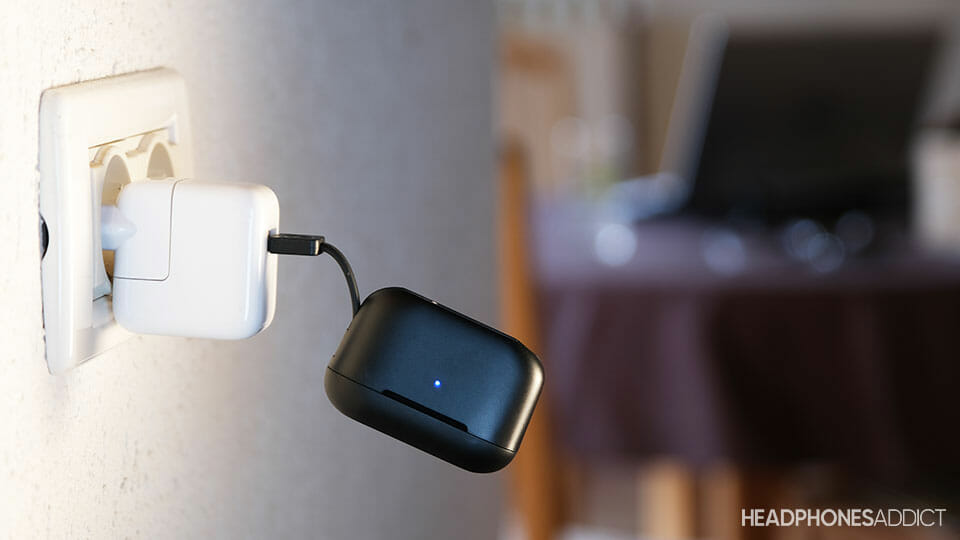
On the one hand, that’s practical since you’ll never forget the charging cable. However, you’ll still need a charging brick or another device with a USB port. Also, the cable is very short, leaving the case in an awkward dangling position.
JLab doesn’t say anything about the fast-charging support or how long it takes for earbuds to charge.
Features

JLab Go Air Pop features consist of touch controls, 3 EQ profiles (modes or presets), a built-in USB cable, and a decent microphone for phone calls.
Most JLab earbuds under $50 are very similar in the features department. They all have built-in cables and three EQ presets.
Speaking of the latter, you have to triple tap on the right earbud to switch between the profiles.
Earbuds use touch-sensitive controls that work quite reliably.
JLab Go Air Pop controls:
- Play/pause/end call – double tap on the right bud
- Song forward/reject call – press and hold on the right bud
- Song backward/reject call – press and hold on the left bud
- Volume controls up/answer call – single tap on the right bud
- Volume controls down/answer call – single tap on the left bud
- Voice assistant/end call – double tap on the left bud
- Change EQ mode – triple tap on the right bud
Microphone Quality
JLab Go Air Pop ensure a good call quality for the price, despite some heavy compression.
Check the JLab Go Air Pop Microphone Test
Making phone calls in quiet places yields the best results. There’s some distortion and compression present, but nothing that would hurt the clarity of your speech.
Speaking of voice, it is a bit thin as the mic only keeps the most important frequencies.
The frequency spectrum gets narrower when you start a call in a noisy environment, making your voice even thinner and more distorted.
However, earbuds keep your voice understandable while removing a large portion of outside noises, which is the most important.
Despite being cheap wireless earbuds, JLab Go Air Pop will suffice for making quick phone or video calls.
Noise Isolation

JLab Go Air Pop can passively isolate ambient noise quite well. They’re on par with earbuds that use foam tips, which is impressive.
Regarding stability, JLab Go Air Pop heavily rely on ear canal fit. They have to create a tight seal to keep them in place. Consequently, they also isolate from background noise well.

While tiny, earbuds create a tight seal without producing annoying in-ear pressure.
Comparing them to Sony WF-1000XM4, bulky earbuds with hybrid foam/silicone tips, they both isolate to the same degree.
That makes JLab Go Air Pop better than most earbuds I’ve tested. The only ones better are the buds with multi-flanged tips or extremely deep insertion (like Etymotic in-ear monitors).
What about sound leakage?
Fortunately, JLab buds excel in the sound leakage category, too. When I was testing them on my MiniDSP rig, I initially thought they aren’t playing. But they just let out very little noise.
That means you can easily blast your music out in public without fearing others might hear your playlist.
Bluetooth

JLab Go Air Pop offer a somewhat average Bluetooth range, no video lag on YouTube but a slight delay in mobile games, and a mono mode. No multipoint, though.
JLab Go Air Pop come with Bluetooth 5.1, ensuring a stable connection when keeping your audio transmitting device in the vicinity.

However, Bluetooth range is all about signal strength, not Bluetooth’s version. Unfortunately, the Go Air Pop’s range is only average at best.
- In my regular indoor test, earbuds endured around 45 feet in distance (or 13.7 meters), with audio cutting off right after passing the second brick wall.
How is pairing?
The pairing process is always automatic, regardless of how many times you have already paired the earbuds.
- You take the earbud out of the case and wait a few seconds to hear the “ready to pair” prompt.
- Then search for devices on your gadget of choice, and earbuds should appear in the Bluetooth menu.
What Bluetooth Codecs Do They Use?
JLab Go Air Pop use SBC and AAC, the latter being a default Bluetooth codec on iOS and Android (even though it doesn’t work as optimally on the latter).
You can force your Android smartphone to use SBC in “Developer Options.” However, the phone will return to using AAC each time you re-pair the earbuds.
Is There an Audio Lag?
Watching videos on YouTube shows no audio delay, making a JLab Go Air Pop great for watching videos.
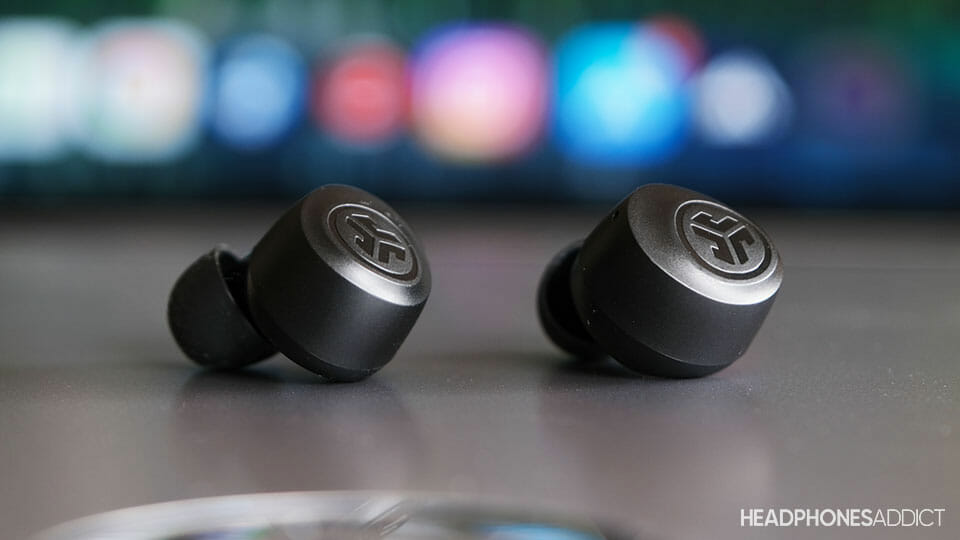
On the other hand, playing mobile games reveals a slight delay between what you hear and what’s happening on the screen.
But the lag won’t be that distracting unless you’re playing fast-paced competitive games.
Should You Get JLab Go Air Pop?

If you’re on a budget and want colorful true wireless earbuds that don’t suck, JLab Go Air Pop are a great all-around package.
While they aren’t the best-sounding wireless earbuds under $30, they offer other qualities:
Excellent passive isolation, more than 9 hours of battery life, and long-lasting comfort will appeal to many commuters, travelers, and gym-goers.

On the other hand, they aren’t the most suitable for audio purists, extreme sportspeople, and travelers who want complete silence and would prefer active noise cancellation.
Overall, for around $26, JLab Go Air Pop are definitely worth considering.
How do JLab Go Air Pop compare to the competition?
- They’re more comfortable and stable than some other true wireless earbuds under $30.
- With more than 9 hours of runtime, they have a better battery life than most of their competitiors.
- They have a reasonably balanced sound but are not as good as some alternatives under $30.
- Feature-wise, they’re on par, if not better than the competition.
JLab Go Air Pop Alternatives
TOZO T10
TOZO’s have a slightly more balanced sound with less bass, but overall, they’re both fun to listen to.
The T10 have a more generic design that fits comfortably but not as securely as JLab’s.
Furthermore, T10’s have a shorter battery life of 6 hours, but they offer Qi wireless charging. Also, they have an IPX8 rating on buds and the case, while JLab only have IPX4.
Skullcandy Dime True Wireless
A cleaner-sounding alternative with a slight V-shape, no boominess or treble harshness. But this is where positives end.
The Dimes aren’t as comfy or stable, have a worse battery life of 3.5 hours, and pack a micro-USB port for charging. Also, they somehow feel even cheaper. Both offer the same IPX4 rating.
In Skullcandy Dime’s defense, they’re slightly cheaper than JLab’s.
CCA LYRA
A wired pick for audio purists who want the best sound quality for as little as possible.
LYRA’s are also more stable thanks to over-the-ear cable and comes with optional button controls and an inline microphone.
However, they need a device with an AUX port to drive them (which is rare nowadays) and can annoy you with a dangling cable.
Furthermore, they aren’t as comfortable during long listening sessions.
What’s in the Box?

- JLab Go Air Pop true wireless earbuds
- Charging case
- 3 pairs of silicone ear tips (S, M, L)
- User guide
Specifications
| Type: | True wireless |
| Connection: | Bluetooth 5.1 |
| Back design: | Closed-back |
| Drivers: | Single dynamic driver |
| Frequency range: | n/a |
| Impedance: | n/a |
| Weight: | 0.14 oz (4g) per earbud |
| Mic & Controls: | Yes |
| Water resistance: | IPX4 |
| Battery life: | 8h + 24h in case |
| Charging time: | Built-in USB-A cable |
| Active noise cancelling: | No |
| Bluetooth codecs: | SBC, AAC |
| Wireless range: | 45 feet (13.7 meters) |
| Microphone: | 2 MEMS microphones (1 in each bud) |

From a childhood fascination with sound, Peter’s passion has evolved into a relentless pursuit of the finest headphones. He’s an audio expert with over 5 years of experience in testing both audiophile and consumer-grade headphones. Quote: “After many years, I can confidently tell which headphones are good and which are terrible.” Find his honest opinion in his reviews.






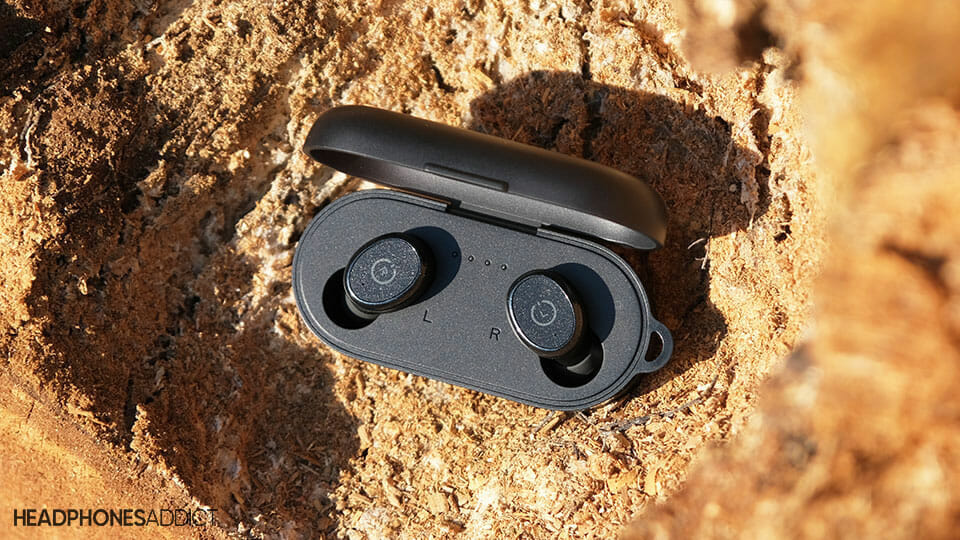
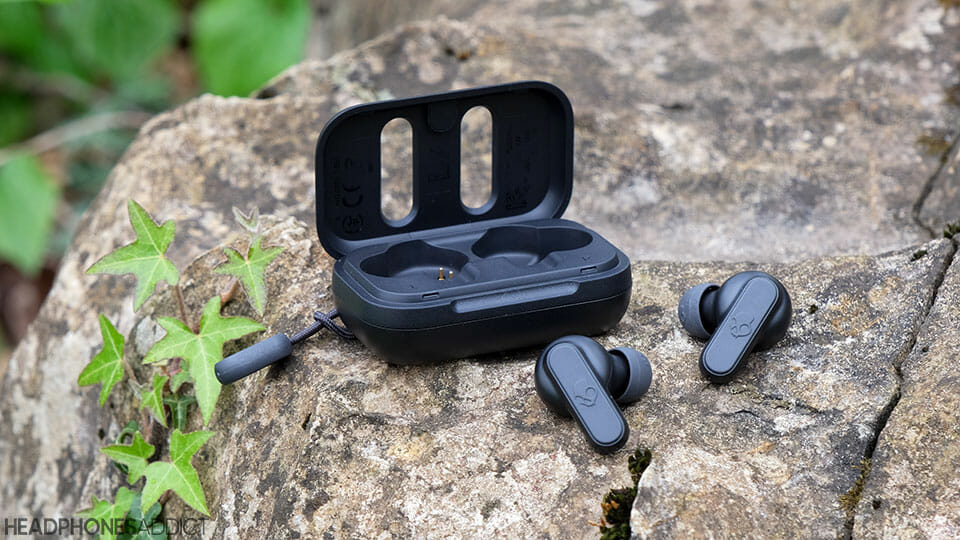
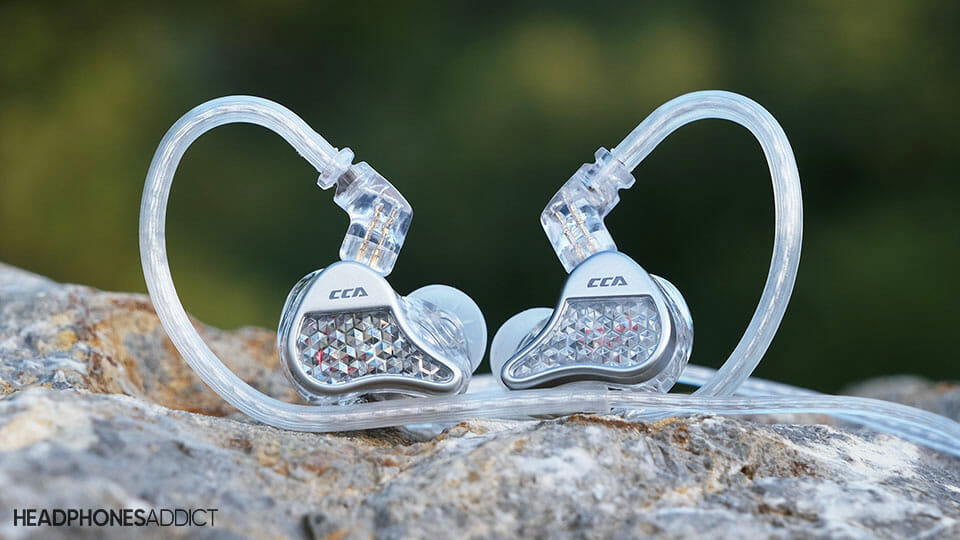
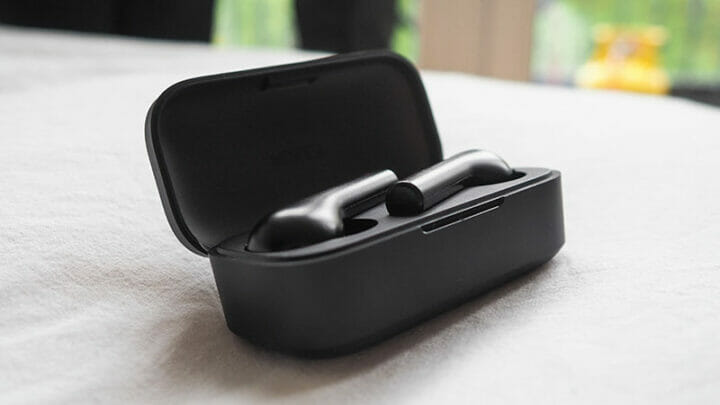
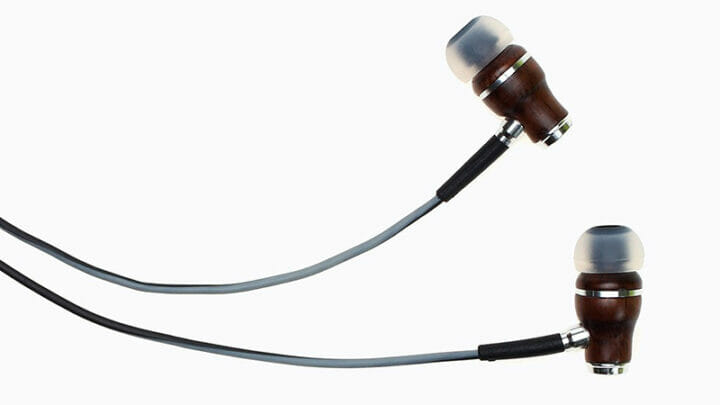
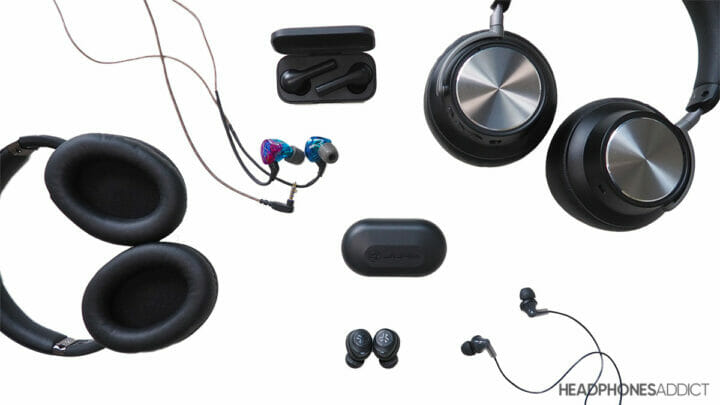
4 Comments
Facundo
This is the best review i ever readed on my life. I can say i agree with all what is in this post because i have this headphones since 1 year. I have to say thanks because i never found in another web site the response frecuency curve in the balance and bass boost modes. I realized about it have a little poor medium frecuency on bass boost and jlab signature mode :(. I would prefer it be more balanced on high and medium frecuency but i am glad because the amazing bass that i get. I choose bass bost the most of the times because i am sensitive to the high frecuency and that peak frequency sometimes bother or hurt me. Cheers from Argentina 🙂
Matija Ferjan
Thanks, we appreciate it Facundo!
Jay Lopiccolo
Good review. These are my go-to wireless earbuds, and I agree with most of your review.
Sounds is good, not great. Fit is good, although I do have problems sometimes with them working loose as I wear them. The connection to my laptop (how I usually use these) is solid, without complaints. I suffer from no audio delays when using them with video. The microphone is easily good enough to use for video conferences.
My only real complaint with these is that the batteries will run out after about a year, no longer holding a full charge. That is why I am on my third pair. That said, since I am on my third pair, I obviously am pretty pleased with them!
They are definitely a great value set of true wireless earbuds.
Peter Susic
Hi Jay,
thanks for the feedback about battery issues since it’s difficult for us to test this kind of long term durability problems. 😀
Glad to hear that you still enjoy using the Go Air Pop. Sadly, the battery is and will remain the main issue of wireless gadgets.